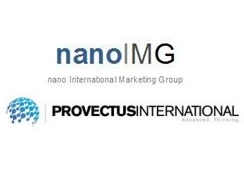New players on the anti-counterfeit block
Phil Taylor, 17-Sep-2010
 Two recently-formed US companies are joining forces to bring a new approach to fighting counterfeit products to market based on nanotechnology.
Two recently-formed US companies are joining forces to bring a new approach to fighting counterfeit products to market based on nanotechnology.
Provectus and NanoIMG claim the 'nanotaggant' technology will enable companies and governmental organisations to authenticate items with an invisible and unique code which is "virtually impossible to replicate."
The technology is based on research carried out by Alexandru Biris, the director and chief scientist at the University of Arkansas at Little Rock's Nanotechnology Centre, and Provectus and NanoIMG have negotiated an exclusive production licensing agreement for the technology.
Provectus was formed in 2009 to patent the technology developed by Dr. Biris' team, while NanoIMG was created earlier this year to develop it commercially.
A US patent covering the nanotaggant technology has been submitted to the US Patent and Trademark Office. It describes various complex nano- and micro-scale structures that are incorporated into a taggant providing different optical, magnetic and spectroscopic identification codes which can be detected by a variety of readers, depending on the complexity of the security level.
"Taggants are commonly used today in the form of radio frequency microchips, physical codes or chemical codes to identify and track individual items or groups of items," according to a UALR statement.
The Provectus/NanoIMG technology "is based upon multiple layers of nanoparticles which are undetectable to the eye, fully customisable and extremely complex in their structure," it added.
The nanotaggants can be applied to a product or its packaging through ink, paint, dissolved polymers or a variety of other materials, and the companies say they are testing applications onto metals and even the use of nanotechnology with DNA.
The intention is to direct the anti-counterfeiting system towards supply chain logistics and distribution channels so that wholesalers and retailers can check the authenticity of products received from suppliers.
NanoIMG says it can provide various types of meters for detecting nanotaggants at the point of assembly, sale or use. The company will also be able to maintain a secure database for the recognition 'fingerprints' of each tagged item or lot.
Pharmaceuticals is one industry on the two firms' list, with other potential applications noted including industrial parts, apparel, cosmetics, energy production, footwear, art and collectibles, consumer packaged goods and security documentation.
Jim Karrh, chief marketing officer of NanoIMG, said: "these nanotaggants can help an enormous number of companies and organisations that are threatened every day by counterfeiting."

©
SecuringIndustry.com




 Two recently-formed US companies are joining forces to bring a new approach to fighting counterfeit products to market based on nanotechnology.
Two recently-formed US companies are joining forces to bring a new approach to fighting counterfeit products to market based on nanotechnology.